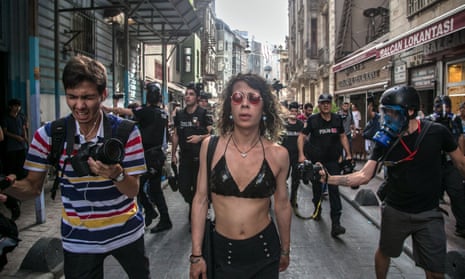Riot police have fired teargas and rubber pellets to disperse an LBGT march in Istanbul that had been banned after ultranationalists said “degenerates” could not demonstrate.
Hundreds of riot police cordoned off Taksim Square in the heart of the city to prevent the Trans Pride rally taking place during Ramadan.
Authorities have banned transgender and gay pride marches this month, which coincides with the period of fasting for Muslims, citing security concerns after warnings against any such events taking place in Turkey.
Ebru Kırancı, a spokeswoman for the Lambdaistanbul LGBTI Solidarity Association, said: “Football fans can rally in this country whenever they want. We were going to do a peaceful activity. [The] holy month of Ramadan is an excuse. If you are going to respect Ramadan, respect us too. The heterosexuals think it’s too much for us, only two hours in 365 days.”
Istanbul’s annual gay pride parade, said to be the biggest event of its kind in the Muslim world, was due to take place on 26 June. Gay pride parades have been held in the city since 2003, attracting tens of thousands of attendees, but last year’s march was broken up by police. Although the Turkish republic is constitutionally secular, the vast majority of the population is Muslim.
Recep Tayyip Erdoğan, who became president in 2014 after 11 years as prime minister, has steadily boosted the power of the head of state’s office with appeals to conservative, nationalist and religious-minded Turks.
This has effectively shifted Turkey from a parliamentary to a presidential system, even before Erdoğan seeks to amend the constitution along such lines through a referendum.
Homosexuality is not a crime in Turkey, unlike many other majority-Muslim countries, but hostility towards gay people remains widespread. Critics say Erdoğan and his conservative Justice and Development party have shown little interest in expanding rights for minority groups, gay people and women, and accuse them of being intolerant of dissent.
The assault by riot police came after a gang armed with sticks and bottles attacked a music store where people had gathered to listen to Radiohead’s new album on Friday night, apparently in protest at people drinking beer during Ramadan.
